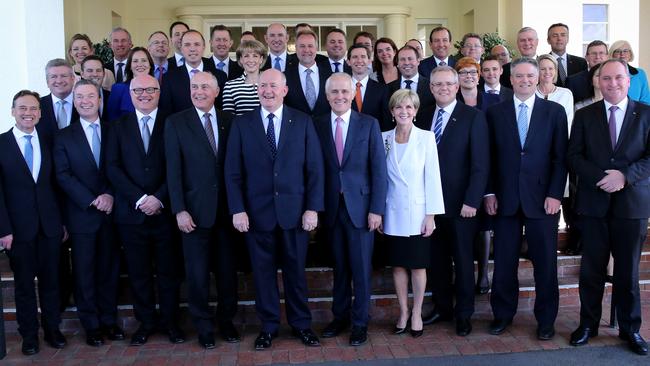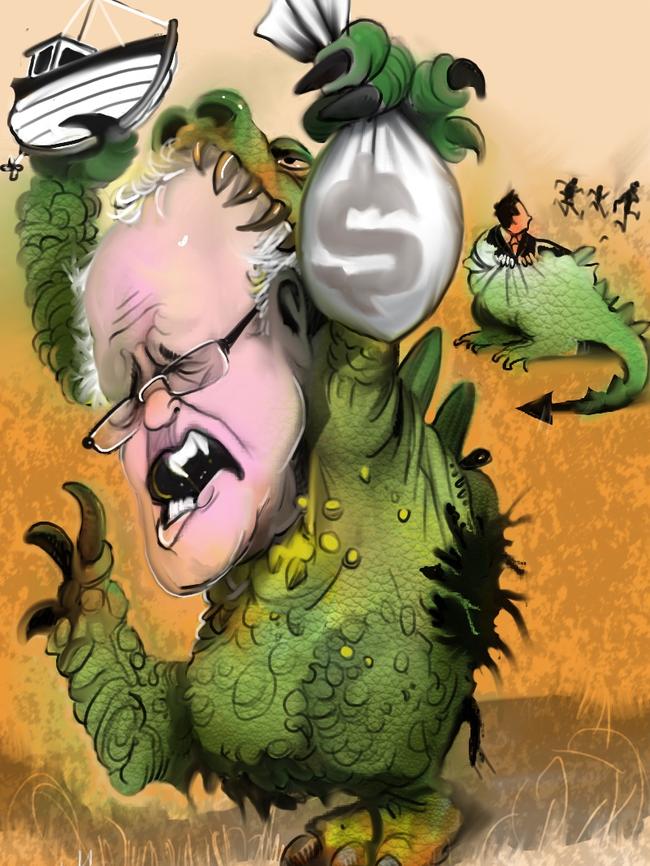Huffing and puffing his way to the poll

The collapse of the moderate leadership within the Liberal Party began with the posting of George Brandis to London as Australia’s high commissioner to Britain. It was completed by the coup against Malcolm Turnbull, which led to the demise of Turnbull himself, then the departures of Julie Bishop and Christopher Pyne.
Pyne has been both the most influential and vocal advocate for moderate causes, as sprightly and as provocative at his resignation press conference as he was when he first arrived in Canberra more than a quarter of a century ago. But it made him many enemies, including, now, Bishop.
There are those cheering, both inside the Liberal Party and from the sidelines, as they watch this disintegration of alliances and friendships among the moderates and their internal scuffles, but the celebrations are premature and ignore the deep problems elsewhere.
The people from both sides who for so long helped make or break leaders, or had influence over them, are gone or compromised or under threat of extinction from the voters.
The conservatives have also suffered major hits post-coup. Michael Keenan and Steven Ciobo have quit. Mathias Cormann is but a shadow of his former self, hollowed out personally and with diminished influence politically, at least inside the Morrison government. There are those who believe his departure from parliament after the election will only be a matter of time.
On the moderate side now the two most likely to step up are Trade Minister Simon Birmingham and Families and Social Services Minister Paul Fletcher. Both are solid media performers, except for Birmingham’s blip on Catholic education funding when he responded to the misleading campaign run by some advocates by referring to pieces of silver. Along with Pyne, they played key roles last year during the coup, and both men are highly respected by their moderate colleagues.
Others such as Trent Zimmerman, smart and articulate, will also step up. Amid the gloom of the government’s wider election prospects, there are hopes that Dave Sharma will regain Wentworth for the Liberals and, once inside parliament, develop into a strong voice for moderate causes.

Liberals say independent Kerryn Phelps is stretched too thin with three jobs — doctor, councillor and federal MP — that some of the angst over Turnbull’s ousting has subsided and Sharma is a quality candidate who is much better known in the electorate now than during last October’s Wentworth by-election.
Last week Sharma, in comments that will do him no harm in Wentworth, came out publicly to say Australia had to do more on the international stage on climate change, including trying to persuade the US to rejoin the Paris Agreement. That’s a long way from where the Abbottistas were last year when they were demanding that Turnbull follow Donald Trump and quit Paris.
There is barely a peep from the Abbottistas now, not even after Environment Minister Melissa Price, in a rare interview, blamed climate change for the recent bushfires.
Meanwhile, the Right remains confident Peter Dutton will hang on to his seat of Dickson. If he does, and there are so many ifs, probabilities and possibilities tied up with Dutton’s future, then it will leave him well placed to challenge again for the Liberal leadership, perhaps with greater success than last time.
Likewise, there are so many ifs, buts and maybes involving Tony Abbott’s future, also including the big if: Can he squeak home in Warringah? No Liberal is prepared to say yet that Abbott is done for, only going so far as to concede he is “in deep trouble”. While he lives and breathes and remains a member of parliament, Abbott’s desire to regain the leadership remains unabated. Here is another big if: anything is possible if he is the last man standing.
In the longer term, conservatives like Christian Porter and Andrew Hastie and Josh Frydenberg, who dances between Left and Right — again if they hang on to their seats — will be contenders. One other interesting sidelight: If both Abbott and Scott Morrison are gone, it will be the first time in decades that NSW will be unable to field a candidate for the federal leadership.
In the meantime, the civil war by proxy between moderates and conservatives rages in the Curtin by-election, where two women have become human shields. The two frontrunners, Erin Watson-Lynn and Celia Hammond, both sound like they would make decent MPs, yet both are being damaged as supporters of each leak historical comments to show the other is either too liberal (on refugees) or too Liberal (on gays).
It is only a warm-up for what will follow if the Coalition loses.
The Prime Minister is of course doing whatever he can to make sure the government survives, and his leadership along with it. A respectable loss, as opposed to annihilation, could ensure Morrison hangs on as opposition leader. He needs to limit the losses to enhance his chances of staying as leader.
Morrison only has a small band of rusted-ons inside the party.
He is not particularly well liked by the conservatives, although he has been given credit for calming the tensions and suppressing the disunity, particularly by the moderates who facilitated his ascension last August because they feared if they did not, Bishop would beat Morrison, then Dutton would beat Bishop.
In the wake of all that, the increasing number of resignations has made Morrison’s task more difficult as he desperately tries to run twin scare campaigns, first on border protection and second on the economy against Bill Shorten.
MPs out in the field have so far picked up little to encourage them to believe the scare on borders is working. Without a vote or a boat, it all sounds like so much huffing and puffing. His tokenistic visit to Christmas Island yesterday is unlikely to help. Shorten said it was a frolic. It smells more like panic.
The other scare was complicated by the release of the national accounts showing sluggish economic growth. That didn’t stop Frydenberg’s valiant repetition that the fundamentals remain strong, and even if they aren’t, it would be much worse under Labor. It also didn’t stop Labor claiming Morrison and Frydenberg had delivered a per capita recession.
Even though he was too squeamish to use it himself, Morrison was desperate to get the R-word out there. He got what he wished for.


